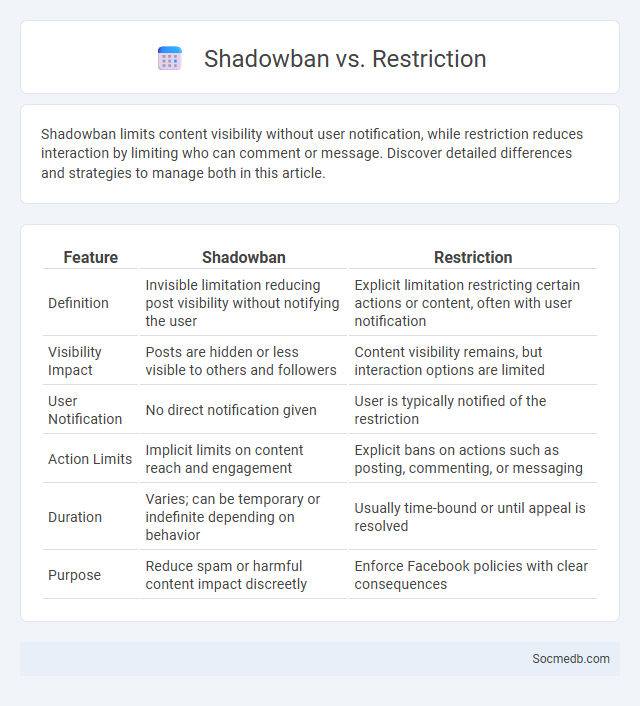
Photo illustration: Shadowban vs Restriction
Shadowban limits content visibility without user notification, while restriction reduces interaction by limiting who can comment or message. Discover detailed differences and strategies to manage both in this article.
Table of Comparison
| Feature | Shadowban | Restriction |
|---|---|---|
| Definition | Invisible limitation reducing post visibility without notifying the user | Explicit limitation restricting certain actions or content, often with user notification |
| Visibility Impact | Posts are hidden or less visible to others and followers | Content visibility remains, but interaction options are limited |
| User Notification | No direct notification given | User is typically notified of the restriction |
| Action Limits | Implicit limits on content reach and engagement | Explicit bans on actions such as posting, commenting, or messaging |
| Duration | Varies; can be temporary or indefinite depending on behavior | Usually time-bound or until appeal is resolved |
| Purpose | Reduce spam or harmful content impact discreetly | Enforce Facebook policies with clear consequences |
Understanding the Concept of Shadowban
Shadowban is a social media moderation strategy that restricts a user's content visibility without their knowledge, often due to violations of platform guidelines or suspicious activity. Your posts may not appear in hashtags, searches, or followers' feeds, significantly reducing engagement and reach. Recognizing shadowban symptoms early helps you adjust your content and adhere to community standards to regain full platform functionality.
What Is Account Restriction?
Account restriction on social media refers to limitations imposed on a user's profile to reduce their interaction capabilities without full suspension. These restrictions may include temporary bans from posting, commenting, or sending messages, often triggered by violations of platform policies like harassment or misinformation. Such measures aim to protect the community while allowing users to continue accessing basic features under monitored conditions.
Key Differences Between Shadowban and Restriction
Shadowban limits the visibility of your content to others without notifying you, causing a significant drop in engagement and reach on platforms like Instagram or Twitter. Restriction allows you to control interactions by hiding comments from certain users or limiting who can contact you, providing more direct management over your account's communication. Understanding these distinctions helps you better manage your social media presence and maintain your account's overall health.
Signs You’ve Been Shadowbanned
Your social media engagement suddenly drops despite consistent posting, indicating a potential shadowban restricting your visibility. Posts receive few or no comments, likes, or shares from new or casual followers, signaling limited reach. Tracking hashtag performance reveals your content isn't appearing in public feeds, confirming your account may be shadowbanned.
How Account Restrictions Are Applied
Account restrictions on social media platforms are applied through automated systems and manual reviews to detect violations of community guidelines such as hate speech, misinformation, or spam. Restrictions can include temporary suspensions, feature limitations, or permanent bans depending on the severity and frequency of infractions. Platforms utilize machine learning algorithms to monitor user behavior patterns and flag content for further human assessment to ensure policy compliance.
Impact of Shadowban vs Restriction on Engagement
Shadowban limits the visibility of your social media content by hiding it from non-followers and reducing reach without notifying you, significantly decreasing organic engagement and follower growth. Restrictions, such as temporarily blocking comments or limiting posting abilities, directly affect your interaction opportunities but are often more transparent and reversible, allowing you to adjust strategies accordingly. Understanding these differences helps you maintain consistent audience engagement and adapt your content to platform policies.
Common Reasons for Getting Shadowbanned or Restricted
Shadowbanning on social media often occurs due to violations such as posting spammy content, using banned hashtags, or engaging in aggressive follower interactions that trigger platform algorithms. Content perceived as misleading, offensive, or violating community guidelines can result in restrictions to limit visibility. Automated filters frequently target repetitive behaviors and sudden spikes in activity, identifying potential bots or fake accounts.
How to Check if You’re Shadowbanned or Restricted
To check if you're shadowbanned or restricted on social media platforms like Instagram or Twitter, start by searching your username incognito or from a different account to see if your posts appear in search results or hashtags. Use online tools specifically designed for detecting shadowbans, such as Shadowban.eu or Triberr, which analyze your account visibility and engagement data. Monitor sudden drops in likes, comments, and follower growth as these can indicate restrictions imposed by the platform's algorithms.
Tips to Avoid Shadowban and Restrictions
To avoid shadowbans and restrictions on social media platforms like Instagram and TikTok, consistently follow community guidelines by avoiding spammy behavior such as excessive hashtags, repetitive comments, and using third-party automation tools. Engage authentically by interacting with followers through meaningful comments and balanced posting frequencies, ensuring content diversity to prevent algorithmic flags. Regularly update account security settings and monitor analytics for sudden drops in engagement that may indicate a shadowban.
Steps to Recover from Shadowban or Restriction
Identify signs of a social media shadowban by monitoring sudden drops in engagement, reduced post visibility, and restricted hashtag reach. Review platform community guidelines and delete content that violates policies to prevent further penalties. Gradually increase authentic interactions, diversify content types, and avoid spammy behaviors to restore account trust and recover from restrictions effectively.
 socmedb.com
socmedb.com